| Srl | Item |
| 1 |
ID:
151902
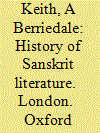

|
|
|
|
|
| Publication |
London, Oxford University Press, 1920.
|
| Description |
xxxvi, 575p.hbk
|
| Contents |
(B)
|
|
|
|
|
|
|
|
|
|
|
|
Copies: C:1/I:0,R:0,Q:0
Circulation
| Accession# | Call# | Current Location | Status | Policy | Location |
| 058970 | 891.2/KEI 058970 | Main | On Shelf | General | |
|
|
|
|
| 2 |
ID:
139389
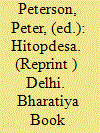

|
|
|
|
|
| Edition |
Reprint
|
| Publication |
DelhI, Bharatiya Book Corporation, 1985.
|
| Description |
x, 334p.Pbk.
|
| Contents |
Actual author of the book is : Narayana Pandita
B
|
|
|
|
|
|
|
|
|
|
|
|
Copies: C:1/I:0,R:0,Q:0
Circulation
| Accession# | Call# | Current Location | Status | Policy | Location |
| 058248 | 891.2/PET 058248 | Main | On Shelf | General | |
|
|
|
|
| 3 |
ID:
127724
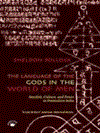

|
|
|
|
|
| Publication |
Ranikhet, Permanent Black, 2006.
|
| Description |
xiv, 684p.Pbk
|
| Standard Number |
8178242753
|
|
|
|
|
|
|
|
|
|
|
|
Copies: C:1/I:0,R:0,Q:0
Circulation
| Accession# | Call# | Current Location | Status | Policy | Location |
| 057612 | 891.209/POL 057612 | Main | On Shelf | General | |
|
|
|
|
| 4 |
ID:
191121
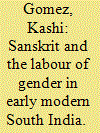

|
|
|
|
|
| Summary/Abstract |
In the early eighteenth century, a husband and co-wife trio undertook a household project in Maratha-ruled Tanjavur. These migrants from the Western Deccan jointly authored a set of Sanskrit commentaries invested in the idea of ‘Maharashtrianness’. The unusual authoring of a Sanskrit commentary by these women alongside their husband exemplifies broader changes that were taking place in Sanskrit intellectual circles in early modern South India. Tracing new formulations of regional identity, changing ideologies of gender, and shifts in the very labour of Sanskrit intellectual production, I demonstrate how new avenues of access to Sanskrit emerged for women in early modern South India. These new avenues of access were facilitated by the growing importance of the household as a site of cultural production and the rise of new regional courts in the Karnatak and Coromandel Coast regions.
|
|
|
|
|
|
|
|
|
|
|
|
|
|
|
|
| 5 |
ID:
117082
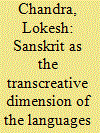

|
|
|
| 6 |
ID:
145166
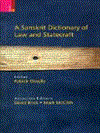

|
|
|
|
|
| Publication |
DelhI, Primus Books, 2015.
|
| Description |
xxiv, 448p.hbk
|
| Standard Number |
9789384082642
|
|
|
|
|
|
|
|
|
|
|
|
Copies: C:1/I:0,R:1,Q:0
Circulation
| Accession# | Call# | Current Location | Status | Policy | Location |
| 058669 | 349.5403/OLI 058669 | Main | On Shelf | Reference books | |
|
|
|
|
| 7 |
ID:
171305
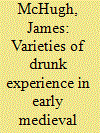

|
|
|
|
|
| Summary/Abstract |
Scholars of Indian cultural history have neglected the topic of alcohol and drinking, instead mostly emphasising a discourse of abstinence. Yet many Sanskrit technical and literary texts of the first through the early second millennium CE describe drinking in a positive light. There, drink is presented as a vital accessory for pleasure: drink is tasty, drink enhances the senses, loosens inhibitions and is associated with the enjoyment of sex for both women and men. The drinker is also an entertaining spectacle. Even those who abstained for religious reasons could savour the pleasures of drink as presented in poetry. Thus, within certain Sanskrit discourses that were presumably produced and used by an (unfortunately vaguely defined) educated elite through the later first and early second millennium CE, the multifaceted pleasures of drink are quite often celebrated. It is only by using a restricted archive that one would conclude that attitudes to drink among those who consumed Sanskrit texts in the early medieval period were largely negative.
|
|
|
|
|
|
|
|
|
|
|
|
|
|
|
|